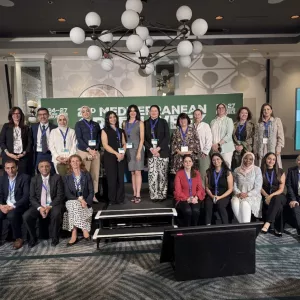Why Women, Peace and Security Plans in the Mediterranean Must Confront Climate Risks
Women, Peace, and Security (WPS) National Action Plans are a powerful but underused tool for tackling the interconnected challenges of gender, climate, and conflict. Across the Mediterranean region, these plans often fail to address how climate change is deepening gendered vulnerabilities, and that omission is a missed opportunity. At the 2nd Mediterranean Climate Week, CGIAR’s MENA Climate Security Hub joined

Why Women, Peace and Security Plans in the Mediterranean Must Confront Climate Risks
Women, Peace, and Security (WPS) National Action Plans are a powerful but underused tool for tackling the interconnected challenges of gender, climate, and conflict. Across the Mediterranean region, these plans often fail to address how climate change is deepening gendered vulnerabilities, and that omission is a missed opportunity.
At the 2nd Mediterranean Climate Week, CGIAR’s MENA Climate Security Hub joined other policymakers, researchers, and practitioners to explore the complex links between gender, climate, and security. This was a key moment that cast the spotlight on women, especially in the South Mediterranean, who face greater exposure to climate stress, economic instability, and political exclusion.

Climate change is crippling women farmers
Agriculture is a clear example. Many women in this region rely on farming for their livelihoods, yet face limited land rights, poor access to water, and minimal support from policy systems. When droughts or crop failures hit, women are often the least equipped to respond or recover. Therefore, any serious climate adaptation strategy must center their needs; land rights, financial support, and participation in decision-making forums. These interventions should be integrated within broader climate adaptation and peacebuilding efforts, ensuring women’s voices and expertise inform decisions affecting their communities.
National Action Plans developed under the Women, Peace, and Security (WPS) agenda should be the framework tying these threads together. But many in the region don’t mention climate risks at all. Where they do, the connections to peace, security, and gender equity are often vague or underdeveloped, reflecting a gap in policy coherence and coordination. A more effective approach would integrate climate explicitly, acknowledging how it worsens insecurity for women, directing resources to address these gaps, and involving women from climate-affected communities in policymaking. Moreover, empowering women as active agents of change in climate resilience, peacebuilding, and community development is vital.
What the Mediterranean can learn from Africa
Africa offers a roadmap. In several countries, grassroots women’s groups have helped reshape WPS plans to reflect climate realities—demonstrating what’s possible when local experience informs national policy. Mediterranean policymakers and practitioners can learn from these African success stories. Effective knowledge transfer includes dialogue platforms, collaborative research, and joint policy development forums.
These lessons are relevant for Mediterranean actors seeking to align peacebuilding, gender equality, and climate resilience more closely.
By bridging knowledge between Africa and the Mediterranean, stakeholders can develop comprehensive strategies informed by shared experiences and best practices. Such collaboration can stimulate coordinated advocacy efforts, increase global recognition of climate-gender-security linkages, and promote sustainable peace and resilience across both regions.
Now is the time for Mediterranean countries to revisit their WPS National Action Plans with climate in mind. It should not be treated as a bonus, but as a core pillar of peace and security.
Authors: Sara Rabie & Ibukun Taiwo, Alliance of Bioversity & CIAT
This work was carried out with support of the CGIAR Climate Action, and Food Frontiers and Security Science Programs. We would like to thank all funders whosupported this research through their contributions to the CGIAR Trust Fund(https://www.cgiar.org/funders).

